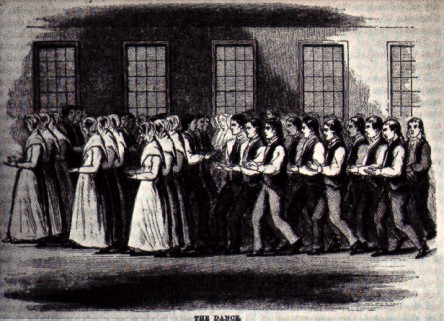| Experimental
societies such as the Shakers. |
 |
|
In
their early years, Shakers used exuberant dance in worship
|
Many Christians
have sought to change society by engaging with it; others have chosen
to withdraw from society to create a perfect Christian community or simply
to worship God. Such aims are often associated with Roman Catholic monasticism,
but nineteenth-century America had many Protestant religious communities.
The Shakers, for example, made celibacy a condition for membership; thus
the Shaker movement could grow only by winning converts and taking in
orphans. The Shakers were founded by Ann Lee (1736-1784) and at their
high point in the 1840s had perhaps 6,000 members living in various Shaker
communities. They had strong Adventist beliefs
in the return of Christ. The Shakers held all goods in common and believed
in work as an act of praise and holiness, under the motto "hands to work,
hearts to God." They practiced equality of men and women, led a life of
simplicity, and worshipped with exuberant song and dance. Other utopian
communities included the Amana, Oneida, New Harmony, and the early Mormons.
|